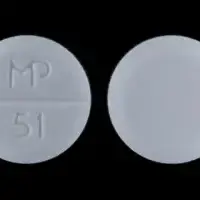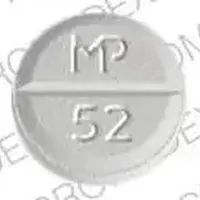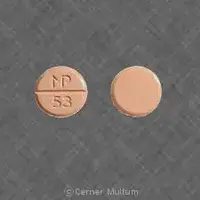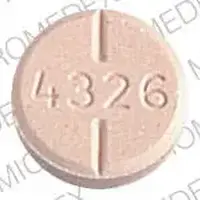Generic name: prednisone
Drug class: Glucocorticoids
Availability: Prescription only
Pregnancy & Lactation: Risk data available
Brand names: Rayos
What is Prednisone?
Prednisone is a corticosteroid medicine used to decrease inflammation and keep your immune system in check, if it is overactive. Prednisone is used to treat allergic disorders, skin conditions, ulcerative colitis, Crohn’s disease, arthritis, lupus, psoriasis, asthma, chronic obstructive pulmonary disease (COPD) and many more conditions.
Warnings
Prednisone treats many different conditions such as allergic disorders, skin conditions, ulcerative colitis, arthritis, lupus, psoriasis, or breathing disorders.
You should avoid taking prednisone if you have a fungal infection that requires oral antifungals. Topical antifungals may not be an issue, but always let your doctor know what medicines you’re taking before starting this medicine.
Steroid medication can weaken your immune system, making it easier for you to get an infection. Avoid being near people who are sick or have infections. Do not receive a "live" vaccine while using prednisone.
Call your doctor at once if you have shortness of breath, severe pain in your upper stomach, bloody or tarry stools, severe depression, changes in personality or behavior, vision problems, or eye pain.
You should not stop using prednisone suddenly. Follow your doctor's instructions about tapering your dose.
How should I take Prednisone
Prednisone comes as a tablet, delayed-release tablet, as a solution (liquid), and as a concentrated solution to take by mouth. Prednisone is usually taken with food one to four times a day or once every other day. Your doctor will probably tell you to take your dose(s) of prednisone at certain time(s) of day every day. Your personal dosing schedule will depend on your condition and on how you respond to treatment. Follow the directions on your prescription label carefully, and ask your doctor or pharmacist to explain any part you do not understand. Take prednisone exactly as directed. Do not take more or less of it or take it more often or for a longer period of time than prescribed by your doctor.
If you are taking the concentrated solution, use the specially marked dropper that comes with the medication to measure your dose. You may mix the concentrated solution with juice, other flavored liquids, or soft foods such as applesauce.
Swallow the delayed-release tablet whole; do not chew or crush it.
Your doctor may change your dose of prednisone often during your treatment to be sure that you are always taking the lowest dose that works for you. Your doctor may also need to change your dose if you experience unusual stress on your body such as surgery, illness, infection, or a severe asthma attack. Tell your doctor if your symptoms improve or get worse or if you get sick or have any changes in your health during your treatment.
If you are taking prednisone to treat a long-lasting disease, the medication may help control your condition but will not cure it. Continue to take prednisone even if you feel well. Do not stop taking prednisone without talking to your doctor. If you suddenly stop taking prednisone, your body may not have enough natural steroids to function normally. This may cause symptoms such as extreme tiredness, weakness, slowed movements, upset stomach, weight loss, changes in skin color, sores in the mouth, and craving for salt. Call your doctor if you experience these or other unusual symptoms while you are taking decreasing doses of prednisone or after you stop taking the medication.
Dosing information
Take prednisone exactly as prescribed by your doctor. Follow all directions on your prescription label. Your doctor may change your dose to make sure you get the best results. Do not take this medicine in larger or smaller amounts or for longer than recommended.
Take prednisone with food.
Your dosage needs may change if you have any unusual stress such as a serious illness, fever or infection, or if you have surgery or a medical emergency. Do not change your medication dose or schedule without your doctor's advice.
Measure liquid medicine with a special dose-measuring spoon or medicine cup. If you do not have a dose-measuring device, ask your pharmacist for one.
Do not crush, chew, or break a delayed-release tablet. Swallow it whole.
While using this medicine, you may need frequent blood tests at your doctor's office. Your blood pressure may also need to be checked.
This medication can cause unusual results with certain medical tests. Tell any doctor who treats you that you are using this medicine.
You should not stop using prednisone suddenly. Follow your doctor's instructions about tapering your dose.
Wear a medical alert tag or carry an ID card stating that you take prednisone. Any medical care provider who treats you should know that you are using a steroid.
Store at room temperature away from moisture and heat.
Before Taking
You should not use this medication if you are allergic to prednisone, or if you have a fungal infection that requires oral antifungal treatment.
Steroid medication can weaken your immune system, making it easier for you to get an infection or worsening an infection you already have or have recently had. Tell your doctor about any illness or infection you have had within the past several weeks.
To make sure prednisone is safe for you, tell your doctor if you have:
-
any illness that causes diarrhea;
-
liver disease (such as cirrhosis);
-
kidney disease;
-
heart disease, high blood pressure, low levels of potassium in your blood;
-
a thyroid disorder;
-
diabetes;
-
a history of malaria;
-
tuberculosis;
-
osteoporosis;
-
glaucoma, cataracts, or herpes infection of the eyes;
-
stomach ulcers, ulcerative colitis, or a history of stomach bleeding;
-
a muscle disorder such as myasthenia gravis; or
-
depression or mental illness.
Long-term use of steroids may lead to bone loss (osteoporosis), especially if you smoke, if you do not exercise, if you do not get enough vitamin D or calcium in your diet, or if you have a family history of osteoporosis. Talk with your doctor about your risk of osteoporosis.
Prednisone can cause low birth weight or birth defects if you take the medicine during your first trimester. Tell your doctor if you are pregnant or plan to become pregnant while using this medication. Use effective birth control.
Prednisone can pass into breast milk and may harm a nursing baby. Tell your doctor if you are breast-feeding a baby.
Steroids can affect growth in children. Talk with your doctor if you think your child is not growing at a normal rate while using this medicine.
What happens if I miss a dose?
Take the missed dose as soon as you remember. Skip the missed dose if it is almost time for your next scheduled dose. Do not take extra medicine to make up the missed dose.
What happens if I overdose?
Seek emergency medical attention or call the Poison Help line at 1-800-222-1222.
An overdose of prednisone is not expected to produce life threatening symptoms. However, long term use of high steroid doses can lead to symptoms such as thinning skin, easy bruising, changes in the shape or location of body fat (especially in your face, neck, back, and waist), increased acne or facial hair, menstrual problems, impotence, or loss of interest in sex.
What should I know about storage and disposal of this medication?
Keep this medication in the container it came in, tightly closed, and out of reach of children. Store it at room temperature and away from excess heat and moisture (not in the bathroom).
It is important to keep all medication out of sight and reach of children as many containers (such as weekly pill minders and those for eye drops, creams, patches, and inhalers) are not child-resistant and young children can open them easily. To protect young children from poisoning, always lock safety caps and immediately place the medication in a safe location – one that is up and away and out of their sight and reach. http://www.upandaway.org
Unneeded medications should be disposed of in special ways to ensure that pets, children, and other people cannot consume them. However, you should not flush this medication down the toilet. Instead, the best way to dispose of your medication is through a medicine take-back program. Talk to your pharmacist or contact your local garbage/recycling department to learn about take-back programs in your community. See the FDA's Safe Disposal of Medicines website (http://goo.gl/c4Rm4p) for more information if you do not have access to a take-back program.
What special dietary instructions should I follow?
Your doctor may instruct you to follow a low-salt, high potassium, or high calcium diet. Your doctor may also prescribe or recommend a calcium or potassium supplement. Follow these directions carefully.
Talk to your doctor about eating grapefruit and drinking grapefruit juice while you are taking this medication.
What should I avoid while using Prednisone?
Avoid being near people who are sick or have infections. Call your doctor for preventive treatment if you are exposed to chicken pox or measles. These conditions can be serious or even fatal in people who are using a steroid.
Do not receive a "live" vaccine while using this medicine. Prednisone may increase your risk of harmful effects from a live vaccine. Live vaccines include measles, mumps, rubella (MMR), rotavirus, yellow fever, varicella (chickenpox), one type of the typhoid vaccine and nasal flu (influenza) vaccine.
Avoid drinking alcohol while you are taking prednisone.
Prednisone side effects
Get emergency medical help if you have any of these signs of an allergic reaction to prednisone: hives; difficult breathing; swelling of your face, lips, tongue, or throat.
Call your doctor at once if you have:
-
blurred vision, eye pain, or seeing halos around lights;
-
swelling, rapid weight gain, feeling short of breath;
-
severe depression, feelings of extreme happiness or sadness, changes in personality or behavior, seizure (convulsions);
-
bloody or tarry stools, coughing up blood;
-
pancreatitis (severe pain in your upper stomach spreading to your back, nausea and vomiting, fast heart rate);
-
low potassium (confusion, uneven heart rate, extreme thirst, increased urination, leg discomfort, muscle weakness or limp feeling); or
-
dangerously high blood pressure (severe headache, blurred vision, buzzing in your ears, anxiety, confusion, chest pain, shortness of breath, uneven heartbeats, seizure).
Other common prednisone side effects may include:
-
sleep problems (insomnia), mood changes;
-
increased appetite, gradual weight gain;
-
acne, increased sweating, dry skin, thinning skin, bruising or discoloration;
-
slow wound healing;
-
headache, dizziness, spinning sensation;
-
nausea, stomach pain, bloating; or
-
changes in the shape or location of body fat (especially in your arms, legs, face, neck, breasts, and waist).
This is not a complete list of side effects and others may occur. Call your doctor for medical advice about side effects. You may report side effects to FDA at 1-800-FDA-1088.
See more: Prednisone Side EffectsWhat other drugs will affect Prednisone?
Many drugs can interact with prednisone. Not all possible interactions are listed here. Tell your doctor about all your medications and any you start or stop using during treatment with prednisone, especially:
-
amphotericin B;
-
cyclosporine;
-
digoxin, digitalis;
-
St. John's wort;
-
an antibiotic such as clarithromycin or telithromycin;
-
antifungal medication such as itraconazole, ketoconazole, posaconazole, voriconazole;
-
birth control pills and other hormones;
-
a blood thinner such as warfarin, Coumadin;
-
a diuretic or "water pill";
-
the hepatitis C medications boceprevir or telaprevir;
-
HIV or AIDS medicine such as atazanavir, delavirdine, efavirenz, fosamprenavir, indinavir, nelfinavir, nevirapine, ritonavir, saquinavir;
-
insulin or diabetes medications you take by mouth;
-
a non-steroidal anti-inflammatory drug (NSAID) such as aspirin, ibuprofen (Advil, Motrin), naproxen (Aleve), celecoxib, diclofenac, indomethacin, meloxicam, and others;
-
seizure medications such as carbamazepine, fosphenytoin, oxcarbazepine, phenobarbital, phenytoin, primidone; or
-
the tuberculosis medications isoniazid, rifabutin, rifapentine, or rifampin.
This list is not complete and many other drugs can interact with prednisone. This includes prescription and over-the-counter medicines, vitamins, and herbal products. Give a list of all your medicines to any healthcare provider who treats you.
What other information should I know?
Keep all appointments with your doctor and the laboratory. Your doctor will order certain lab tests to check your body's response to prednisone.
If you are having any skin tests such as allergy tests or tuberculosis tests, tell the doctor or technician that you are taking prednisone.
Do not let anyone else take your medication. Ask your pharmacist any questions you have about refilling your prescription.
It is important for you to keep a written list of all of the prescription and nonprescription (over-the-counter) medicines you are taking, as well as any products such as vitamins, minerals, or other dietary supplements. You should bring this list with you each time you visit a doctor or if you are admitted to a hospital. It is also important information to carry with you in case of emergencies.
What to Expect
Prednisone usually works quickly, within one to two hours. The extended-release tablets begin working in about six hours.
Prednisone stops its therapeutic effects soon after you discontinue using it. But if you’ve been taking prednisone for a long time, some side effects from the medication may last for a while after you’ve stopped the medicine.
You may need to take prednisone for only a few days. In some cases, you’ll need to use the medicine for an extended period of time, or maybe even for the rest of your life.
If you’re taking prednisone for a long time and need to stop treatment, you might have to taper off slowly.
Additional Dosage Information
Your dosage will depend on your medical condition, your age, weight, and other factors.
Prednisone may not work as well if you don’t follow your medication schedule. Try not to miss a dose.
Secondary Uses
Prednisone is used for numerous medical conditions. Your doctor may recommend it for conditions that aren’t listed in this medical guide.







